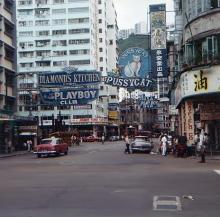11 Sep 1945, Barbara Anslow's diary
Primary tabs
((An extract from a letter dated 11 Sep 1945, that Barbara wrote to a friend in the UK. Many years later the friend handed the letters back to Barbara, luckily for us!))
....'So far we have had no inward mail and are longing for same. Yesterday, Mum and Mabel embarked on the 'Empress of Australia', but their destination is at present unknown, they aim eventually to get to England. I didn't see them on board because they boarded from Stanley. I'm very glad they have got away because, although we expect to follow in a few weeks, there's always the possibility of a hitch, and Olive and I wanted to be sure that Mum and Mabel got out of this place soon. The bunch who left yesterday were told they would be maintained in England or Australia, wherever they wanted to go, and that their passage back to HK in due course would be guaranteed. At present, I'm quite prepared to leave the East for ever!
It's much hotter in town than in Stanley, and we are feeling the heat pretty badly, with all the unaccustomed running about (between offices). Some 700 ex-internees are working in town - mostly men, Government servants and essential services. Some 650 women and children had cabin accommodation on the E. of A., and a few hundreds of Stanley men were given deck accommodation; all the ex-p.o.ws from the men's camps are also aboard in deck accommodation.
Last night we saw our first fairly up-to-date film; it was 'When Irish Eyes are Smiling', and our only regret was that it wasn't in modern costume; of all the films we have been shown this past week not one has been a modern one.. we are dying to see what the world of today looks like, fashions, etc. At present we feel like country cousins; you should have seen us all stare and exclaim the other night when one of the relieving forces produced a perfectly ordinary cigarette lighter! Some of our makeshifts would make you laugh. I suppose things have been pretty short in England during the war, but I wonder if the school children had to rely on cigarette papers on which to do their home and school work? Our men have had to cut grass sometimes to get fuel with which to cook our rations. Life at Stanley was so communal that there was even a comunal coffin, a huge affair with a false bottom, so that each corpse would be carried therein to the cemetry, the coffin lowered into the grave, the false bottom removed by a fixed rope, and returned for the next victim.
A couple of days ago, Mum came in to visit us from Stanley (about half an hour's journey by road from town,) and we ventured to our old flat in Happy Valley. That block of flats had been bombed fairly recently, ours was knocked about but not too broken except for a pile of bricks in the bathroom. No wood in the flat at all, even the staircase had been bereft of wood. No doors or cupboards, the whole place was absolutely bare; only things left were an old plant, out of its pot, which was lying on the verandah, two old lampshades on the floor. The bath remained, although the lavatory had vanished, and the cistern, broken, was on the floor of one of the bedrooms. I looked among little heaps of rubbish for papers or something that looked like home, but such papers there were in Chinese. If there had been one thing that reminded us of home, I think we would have wept, but the absolute lack of reminders made it seem impossible that it was once our home. We also visited Dad's grave, the tomb stone was OK.
Life is rapidly getting back to normal; many people have had perms in the last week, but my hair is too short for one at present. We had swimming at Stanley - a lovely beach, but it was such a drag there and back, we hadn't much energy to go there very much, and the whole of experience of wallowing in the water or swimming - though fantastic - gave us too much of an appetite which couldn't be satisfied on rice and greens. Still it seems too much to realise that we are really free and can eat decent food; I'm only sorry that I can't eat all we are offered, my stomach seems to have shrunk; it breaks my heart to have to refuse food or leave anything on the plate, after the many dreams of food we have had.
We still have had no news of or from the boys ((soldiers)) we knew pre-Dec. 8th, we thought some of them were sent to Japan. ((Two survived, but Olive's fiance died in Japan.))
Things have happened so quickly - it is only a month ago since we were all in a flap in camp because the Japs sent for 170 technicians and their families and sent them off to an unknown destination, later proved to be Kowloon. That was the first sign we had that something might be happening, though we had no idea what; coincident with that was the rumour that Russia had come into the war. On the 14th August the rumours that the war with Japan was over seemed contradicted, because a plane zoomed down very near Stanley and sank a couple of small ships - so the news of the 15th was doubly surprising... we can still hardly believe it! Please excuse incoherence, I think all internees and pows are slightly mental in some way or another, we have poor memories and repeat ourselves, and find life very, very sweet after so much seclusion and restriction.

